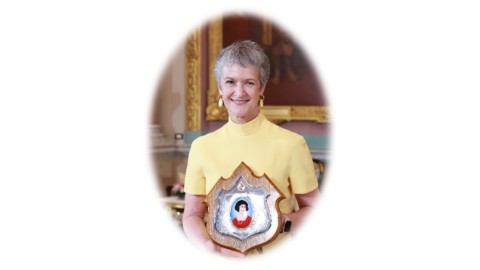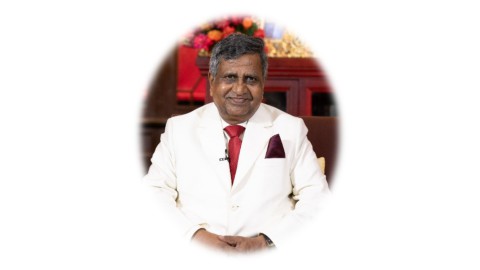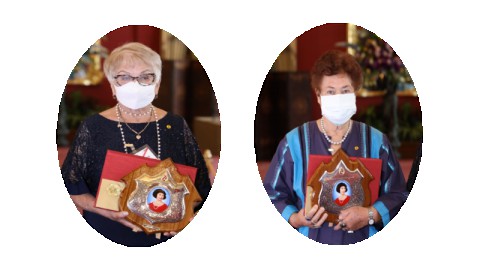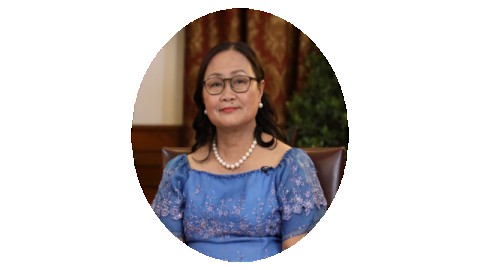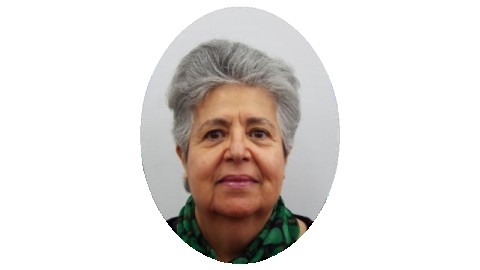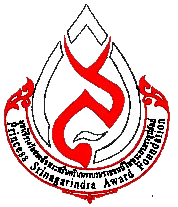
Princess Srinagarindra Award Foundation
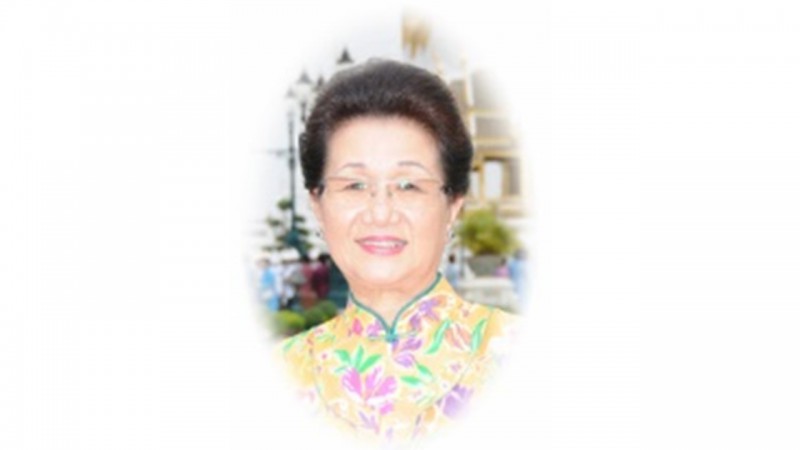
Professor Dr. Yu-Mei Chao, Laureate2008
Professor Dr. Yu-Mei Chao, 70 years of age, obtained her Bachelor’s degree in Nursing from Department of Nursing, National Taiwan University, Taiwan, and furthered her education in the United States of America, where she obtained her Master of Nursing Education and Doctor of Philosophy from School of Nursing, Pittsburgh University. Currently she hold many positions such as Chairperson of Taiwan Nursing Accreditation Council, Adjunct Research Fellow of The National Health Research Institutes, Executive Director of Childhood Cancer Foundation, Chairperson of The Board, Dao-Chen Foundation of Nursing Education and research, and visiting professor at the Department of Nursing, University of Soo-Zhow, Republic of China.
Throughout 50 years of her career in nursing, Dr. Chao has committed herself in learning and striving to bring nursing contribution and impact to the real world of practice. One of her early contributions at institutional level was to open the first position of “Infection Control Nurses” in 1980, in a teaching university hospital, in Taiwan. This new position and role function of an infection control nurse soon was widely adopted by all the acute care hospitals in Taiwan to investigate and control nosocomial infection. Now, infection control nurses in Taiwan have been playing a very important role in providing safe hospital care for patients. Then, in collaboration with the Department of Pharmacy, Dr. Chao was also able to set up a new system of Unit Dose Dispensing (UDD) in a university teaching hospital in 1985. Implementing UDD system not only can save nursing time spent in dispensing drug by nurses but also prevent medication errors. Therefore, the Department of Health (DOH) finally adopted UDD system as one of the mandatory requirements for hospital accreditation program since 1994.
Dr. Chao is very active in conducting and publishing researches both national and international journal. Many of her studies had impact on health care of the people, foe example, the findings of an international collaborative nursing research on “The Impacts of Childhood Cancer to the Chinese Families” which was led by Dr. Ida M Martinson and Dr. Chao and with a group of pediatric hematologists, Childhood Cancer Foundation of the Republic of China (Taiwan) was established in 1981. As one of the 4 founders of this Foundation, Dr. Chao had served as deputy executive director of the Foundation until 2006 and then, she has been invited by the Board to serve as executive director of the Foundation. Over the past 25 years, a total of 12,956 children diagnosed with a cancer have registered to this Foundation. The total financial aids spent through the Foundation to improve the medical and nursing care for these children is around NT$ 677,062,571 (about US$21,841,000.00). As a result of a collective effort among pediatric oncologists and pediatric nurses throughout Taiwan, the survival rate of children diagnosed with acute lymphoblastic leukemia (ALL) has improved from 26% in early days to 79% in 2007. And children suffered from other types of cancer also have now, enjoyed survival rate comparable with those children in the USA and Germany. This achievement is deeply appreciated by the entire society of Taiwan as reflected by persistently offering financial support to the Foundation.
Before the Taiwan National Health Insurance (NHI) system was implemented in 1995, Dr. Chao was able to conduct a research on “Cost-effectiveness of Home Nursing Care Services”, funded by the Council of Economic Development of the Executive Yuan (the cabinet). The finding of this study was then, utilized by the decision-maker of NHI as an evidence to make a policy of including home health care services into NHI payment scheme in 1996. As a result, nursing function which extended beyond the hospitals and reaching the home and community in Taiwan has been greatly encouraged. This also lays an important foundation for Taiwan to develop long-term care system in recent years.
In order to improve the quality of nursing education and research, Dr. Chao was one of the few pioneers in social and nursing sciences in Taiwan to introduce “qualitative research” into entire academic arena, in 1980s. Since then, qualitative research approach has been adopted in the field of nursing research as one of the core research approaches. A book on “Qualitative Research-Implication of Field Study Approach in Nursing, was published in 1991, and has since been widely used by readers from many disciplines and countries like China.
Dr. Chao has greatly contributed to the development of nursing leaders in Taiwan. In 1981, with financial support from her family and the donation received from nursing alumni of her alma mater, Dr. Chao was able to establish Dao-Chen Foundation of Nursing Education and Research. Since then, this nursing foundation has granted more than 30 nurses from Taiwan to study abroad for a master or a doctoral degree, mostly in USA. Among the scholarship recipients of this foundation, are outstanding nursing leaders currently active in Taiwan, who themselves have brought changes of nursing practice, education and research to Taiwan. The most note recipient of this foundation is Dr. Co-Shi Chao, the “mother of hospice care” in Taiwan, who has successfully promoted and implemented national wide hospice care system, in 1998.
Dr. Chao is not only a successful nursing leader but also the health profession leader of her country. During the time when serving as the Director General of Bureau of Health Promotion, Department of Health (DOH), from 1989-1995, Dr. Chao was able to complete the first Ten-Years Population-based Health Promotion Plan. In this Plan, health indicators, projected health targets and strategic action plans for the entire population from cradle to grave, were established and designed based on evidences. Preventing injury was one of the top priorities in this National Plan. As a result, statistics reveal that 10 leading causes of death in Taiwan total population due to unintentional injury has eventually dropped from the 3rd before 2002 and has remained the 5th since 2003. This successful public health policy has made great impacts not only to the life of people but also to the social economic prosperity to Taiwan. Since prevention of traffic injury has eventually become an inter-ministerial policy.
At regional level, beginning from 1997, Dr. Chao have been actively involved in promoting nursing academic exchanges in the Asian region through East Asian Forum of Nursing Scholars (EAFONS). Seven countries with doctoral nursing programs in this region have brought their doctoral prepared nursing scholars and doctoral students together every year, to share nursing knowledge and experiences unique to the region. To-day, collaborative research among nursing scholars in this region are emerging and developing. It is hoped that discovery of richness of nursing research from eastern culture, will soon be recognized worldwide. In the 8th EAFONS held in February 2005, in Seoul, Dr. Chao was invited to share experience of “Designing a Nurse Practitioner System in Taiwan” with nurse scholars in the region. The new practice model of Advanced Nursing Practice system in Taiwan has been considered a very pertinent example for Asian health care environment.
In addition, when serving as the chairperson of the International Council of Nurses (ICN’s) Professional Services Committee, Dr. Chao was able to find funds to host two International Classification of Nursing Practice (ICNP) meetings in Taiwan, inviting 40 National Nurse Associations (NNA) delegates from all over Asian-Pacific region, to become familiar with this ICN’s new initiatives and begin to test and apply ICNP system in individual country context. And then, as a board member of ICN, her proposal to institute ICN’s Asian Workforce Forum, was accepted by ICN Executive Committee in 2000. Since then, NNA delegates from 11 countries with the guidance from ICN, delegates from Asia Pacific Region meet every year in different countries to share nursing issues-problems and strategies for actions. This workforce forum in Asia has provided an important platform for Asian nursing leaders to work hand in hands by way of networking.
Then, with her capacity as the 3rd Vice President of International Council of Nurses (ICN), in 2001-2005, Dr. Chao was able to mobilize resources from government and private sectors, to support one of the most successful ICN Congresses in Taipei in May, 2005. A total of National Nurses Association delegates from 107 countries attended this ICN congress, making the record of having the highest number of national representatives ever participating in ICN congress.
Internationally, since 1980, Dr. Chao have been invited to attend different important international nursing conferences in capacities such as keynote speaker, closing remark speaker, moderator, panelist and paper presenter, on the topics related to maternal cognitive behavior, nursing education, health promotion, health policy and health insurance system in many countries, including USA, Sweden, Spain, Australia, Thailand, Japan, Canada, China, Latvia, South Africa, Norway, Korea, Hong Kong, Macao, Jamaica and Philippines. Thus her contribution to promote nursing international exchange activities has been highly recognized by Taiwan’s Department of Health.
In recognition of Dr. Chao professional achievement, Dr. Chao was invited to serve as visiting professor at UCSF in 1985, visiting scholar at University of Calgary in 1987 and 1988, adjunct professor at University of Illinois in 1993-1994 and 1998, With her rich experiences in international nursing and health, Dr. Chao was elected as a member of Foreign Associates of Institute of Medicine, The National Academies, USA, in 1994 and was the first health professionals, in Taiwan and the 2nd nurse from Asia, only after Dr. Amalia M. Maglagas, to be awarded with this great honor. In 2000, School of Nursing, University of Pittsburgh, awarded Dr. Chao a Distinguished Alumni Award in recognition of her contribution to the advancement of nursing practice, nursing education, nursing research and health policy, internationally. In 2003, in order to appreciate her significant contribution to health and nursing in Taiwan, Dr. Chao was granted the 1st’ Class Golden Medal of Health Merits, The highest Health Services Award in Taiwan by Department of Health, and she is the only nurses in Taiwan so far, to receive such an honor.
Dr. Chao has brought a significant contribution to nursing and health, at national as well as international level. The committee of the Princess Srinagarindra Award Foundation under the Royal Patronage, has come to the final resolution to award Professor Dr. Yu-Mei Chao the Princess Srinagarindra Award of the year 2008
Professor Dr. Yu-Mei Chao, 70 years of age, obtained her Bachelor’s degree in Nursing from Department of Nursing, National Taiwan University, Taiwan, and furthered her education in the United States of America, where she obtained her Master of Nursing Education and Doctor of Philosophy from School of Nursing, Pittsburgh University. Currently she hold many positions such as Chairperson of Taiwan Nursing Accreditation Council, Adjunct Research Fellow of The National Health Research Institutes, Executive Director of Childhood Cancer Foundation, Chairperson of The Board, Dao-Chen Foundation of Nursing Education and research, and visiting professor at the Department of Nursing, University of Soo-Zhow, Republic of China.
Throughout 50 years of her career in nursing, Dr. Chao has committed herself in learning and striving to bring nursing contribution and impact to the real world of practice. One of her early contributions at institutional level was to open the first position of “Infection Control Nurses” in 1980, in a teaching university hospital, in Taiwan. This new position and role function of an infection control nurse soon was widely adopted by all the acute care hospitals in Taiwan to investigate and control nosocomial infection. Now, infection control nurses in Taiwan have been playing a very important role in providing safe hospital care for patients. Then, in collaboration with the Department of Pharmacy, Dr. Chao was also able to set up a new system of Unit Dose Dispensing (UDD) in a university teaching hospital in 1985. Implementing UDD system not only can save nursing time spent in dispensing drug by nurses but also prevent medication errors. Therefore, the Department of Health (DOH) finally adopted UDD system as one of the mandatory requirements for hospital accreditation program since 1994.
Dr. Chao is very active in conducting and publishing researches both national and international journal. Many of her studies had impact on health care of the people, foe example, the findings of an international collaborative nursing research on “The Impacts of Childhood Cancer to the Chinese Families” which was led by Dr. Ida M Martinson and Dr. Chao and with a group of pediatric hematologists, Childhood Cancer Foundation of the Republic of China (Taiwan) was established in 1981. As one of the 4 founders of this Foundation, Dr. Chao had served as deputy executive director of the Foundation until 2006 and then, she has been invited by the Board to serve as executive director of the Foundation. Over the past 25 years, a total of 12,956 children diagnosed with a cancer have registered to this Foundation. The total financial aids spent through the Foundation to improve the medical and nursing care for these children is around NT$ 677,062,571 (about US$21,841,000.00). As a result of a collective effort among pediatric oncologists and pediatric nurses throughout Taiwan, the survival rate of children diagnosed with acute lymphoblastic leukemia (ALL) has improved from 26% in early days to 79% in 2007. And children suffered from other types of cancer also have now, enjoyed survival rate comparable with those children in the USA and Germany. This achievement is deeply appreciated by the entire society of Taiwan as reflected by persistently offering financial support to the Foundation.
Before the Taiwan National Health Insurance (NHI) system was implemented in 1995, Dr. Chao was able to conduct a research on “Cost-effectiveness of Home Nursing Care Services”, funded by the Council of Economic Development of the Executive Yuan (the cabinet). The finding of this study was then, utilized by the decision-maker of NHI as an evidence to make a policy of including home health care services into NHI payment scheme in 1996. As a result, nursing function which extended beyond the hospitals and reaching the home and community in Taiwan has been greatly encouraged. This also lays an important foundation for Taiwan to develop long-term care system in recent years.
In order to improve the quality of nursing education and research, Dr. Chao was one of the few pioneers in social and nursing sciences in Taiwan to introduce “qualitative research” into entire academic arena, in 1980s. Since then, qualitative research approach has been adopted in the field of nursing research as one of the core research approaches. A book on “Qualitative Research-Implication of Field Study Approach in Nursing, was published in 1991, and has since been widely used by readers from many disciplines and countries like China.
Dr. Chao has greatly contributed to the development of nursing leaders in Taiwan. In 1981, with financial support from her family and the donation received from nursing alumni of her alma mater, Dr. Chao was able to establish Dao-Chen Foundation of Nursing Education and Research. Since then, this nursing foundation has granted more than 30 nurses from Taiwan to study abroad for a master or a doctoral degree, mostly in USA. Among the scholarship recipients of this foundation, are outstanding nursing leaders currently active in Taiwan, who themselves have brought changes of nursing practice, education and research to Taiwan. The most note recipient of this foundation is Dr. Co-Shi Chao, the “mother of hospice care” in Taiwan, who has successfully promoted and implemented national wide hospice care system, in 1998.
Dr. Chao is not only a successful nursing leader but also the health profession leader of her country. During the time when serving as the Director General of Bureau of Health Promotion, Department of Health (DOH), from 1989-1995, Dr. Chao was able to complete the first Ten-Years Population-based Health Promotion Plan. In this Plan, health indicators, projected health targets and strategic action plans for the entire population from cradle to grave, were established and designed based on evidences. Preventing injury was one of the top priorities in this National Plan. As a result, statistics reveal that 10 leading causes of death in Taiwan total population due to unintentional injury has eventually dropped from the 3rd before 2002 and has remained the 5th since 2003. This successful public health policy has made great impacts not only to the life of people but also to the social economic prosperity to Taiwan. Since prevention of traffic injury has eventually become an inter-ministerial policy.
At regional level, beginning from 1997, Dr. Chao have been actively involved in promoting nursing academic exchanges in the Asian region through East Asian Forum of Nursing Scholars (EAFONS). Seven countries with doctoral nursing programs in this region have brought their doctoral prepared nursing scholars and doctoral students together every year, to share nursing knowledge and experiences unique to the region. To-day, collaborative research among nursing scholars in this region are emerging and developing. It is hoped that discovery of richness of nursing research from eastern culture, will soon be recognized worldwide. In the 8th EAFONS held in February 2005, in Seoul, Dr. Chao was invited to share experience of “Designing a Nurse Practitioner System in Taiwan” with nurse scholars in the region. The new practice model of Advanced Nursing Practice system in Taiwan has been considered a very pertinent example for Asian health care environment.
In addition, when serving as the chairperson of the International Council of Nurses (ICN’s) Professional Services Committee, Dr. Chao was able to find funds to host two International Classification of Nursing Practice (ICNP) meetings in Taiwan, inviting 40 National Nurse Associations (NNA) delegates from all over Asian-Pacific region, to become familiar with this ICN’s new initiatives and begin to test and apply ICNP system in individual country context. And then, as a board member of ICN, her proposal to institute ICN’s Asian Workforce Forum, was accepted by ICN Executive Committee in 2000. Since then, NNA delegates from 11 countries with the guidance from ICN, delegates from Asia Pacific Region meet every year in different countries to share nursing issues-problems and strategies for actions. This workforce forum in Asia has provided an important platform for Asian nursing leaders to work hand in hands by way of networking.
Then, with her capacity as the 3rd Vice President of International Council of Nurses (ICN), in 2001-2005, Dr. Chao was able to mobilize resources from government and private sectors, to support one of the most successful ICN Congresses in Taipei in May, 2005. A total of National Nurses Association delegates from 107 countries attended this ICN congress, making the record of having the highest number of national representatives ever participating in ICN congress.
Internationally, since 1980, Dr. Chao have been invited to attend different important international nursing conferences in capacities such as keynote speaker, closing remark speaker, moderator, panelist and paper presenter, on the topics related to maternal cognitive behavior, nursing education, health promotion, health policy and health insurance system in many countries, including USA, Sweden, Spain, Australia, Thailand, Japan, Canada, China, Latvia, South Africa, Norway, Korea, Hong Kong, Macao, Jamaica and Philippines. Thus her contribution to promote nursing international exchange activities has been highly recognized by Taiwan’s Department of Health.
In recognition of Dr. Chao professional achievement, Dr. Chao was invited to serve as visiting professor at UCSF in 1985, visiting scholar at University of Calgary in 1987 and 1988, adjunct professor at University of Illinois in 1993-1994 and 1998, With her rich experiences in international nursing and health, Dr. Chao was elected as a member of Foreign Associates of Institute of Medicine, The National Academies, USA, in 1994 and was the first health professionals, in Taiwan and the 2nd nurse from Asia, only after Dr. Amalia M. Maglagas, to be awarded with this great honor. In 2000, School of Nursing, University of Pittsburgh, awarded Dr. Chao a Distinguished Alumni Award in recognition of her contribution to the advancement of nursing practice, nursing education, nursing research and health policy, internationally. In 2003, in order to appreciate her significant contribution to health and nursing in Taiwan, Dr. Chao was granted the 1st’ Class Golden Medal of Health Merits, The highest Health Services Award in Taiwan by Department of Health, and she is the only nurses in Taiwan so far, to receive such an honor.
Dr. Chao has brought a significant contribution to nursing and health, at national as well as international level. The committee of the Princess Srinagarindra Award Foundation under the Royal Patronage, has come to the final resolution to award Professor Dr. Yu-Mei Chao the Princess Srinagarindra Award of the year 2008
